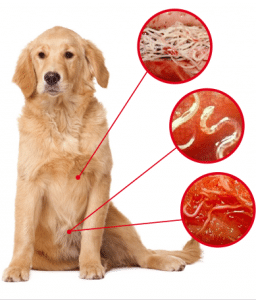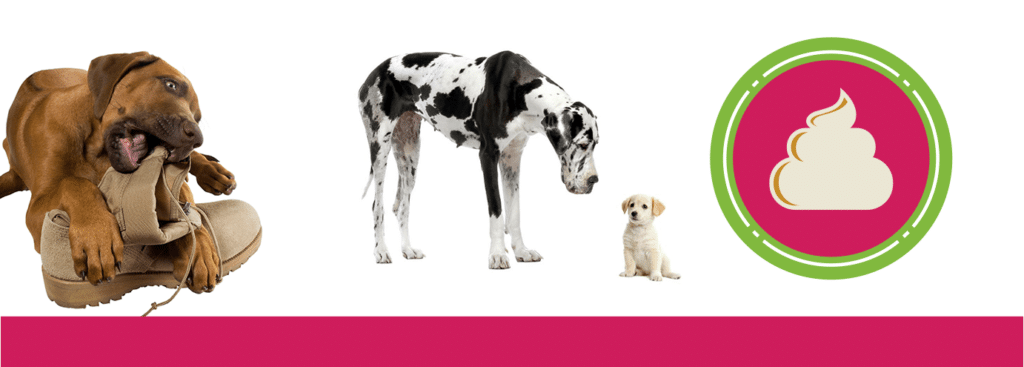Intestinal parasites often referred to as “Worms” can cause severe and life threatening diseases. Much to the surprise of many pet owners, several canine parasites are transmissible to humans as well. This is why understanding these parasitic health symptoms, hazards, and treatments are important to set preventative measures for the whole household.
It is important to realize there are many more parasites other than just roundworms and tapeworms that commonly come to mind. Whipworms, Hookworms, and many other worms can cause serious life threatening complications.
How do dogs get worms?
Most tapeworms require an intermediate host, which means most of the time they aren’t passed from pet to pet. Common intermediate hosts include fleas and small rodents. It’s important to note that dogs will become reinvested with tapeworms if these hosts aren’t controlled.
Dogs can become infected with roundworms by eating worm eggs from contaminated soil or stool. Although more common in cats, dogs can also become infected by eating infected rodents.
Although human infection occurs rarely, it can cause significant health issues depending on where the worms migrate to. If you have been exposed to a pet with worms, we recommend talking with your physician to discuss any potential problems.
Types of worms
Roundworms
Usually spread in feces or during pregnancy or nursing, the roundworm causes a serious infection in dogs and puppies. The roundworm eats the food of its host and may cause diarrhea and other symptoms. It’s important to note that roundworms in puppies can be fatal. Human infection of roundworms can cause even more serious symptoms and implications.
Hookworms
Hookworms suck the blood out of their hosts, mostly in the small intestine. Mothers can infect their puppies, and adult dogs can be infected through their skin or when cleaning themselves. Infection causes many symptoms, mostly weakness and malnutrition which can lead to death in puppies. Humans can also become infected with hookworms from unwashed vegetables or by walking barefoot on sand and soil.
Heartworms
One of the most dangerous worms, heartworms are spread through mosquito bites. They can be up to 14 inches long, and commonly live in the heart and arteries. Heartworms can affect how the heart functions and can cause blood clots which are likely to cause death if untreated. Monthly heartworm preventatives are are effective and Splash and Dash recommends to use a monthly heartworm treatment.
Whipworms
Whipworms live in the area where the small and large intestines meet. Similarly to hookworms, whipworms also suck the blood of their hosts. Dogs commonly pick them up from contaminated soil or by grooming. Whipworms can be quite serious and symptoms include bloody diarrhea especially when there are a large number in the intestine.
Tapeworms
Dogs most commonly are infected with tapeworms from fleas, which carry them. Tapeworms absorb dog’s nutrients from the intestine where they often attach. Tapeworms are each about the size of a grain of rice. These are commonly passed in stool and can be seen around the dog’s anus. Humans can also get tapeworms, but can’t get them from an infected pet.
Ringworm
Despite its name, ringworm is actually not a worm at all. It is a skin infection caused by a fungus. In dogs, ringworm is often seen as a dry, gray, and scary patch. Although it may cause no symptoms at all, it is still important to take your dog to the vet if you notice anything abnormal. Humans can become infected in ringworm as well, however they usually cause a red lesion with a ring-like appearance (hence the name). Infection comes from spores which are commonly found in the soil or on cats, humans can become infected by touching an infected pet. Treatment for ringworm can involve medicated shampoos and ointments. More commonly, an oral medication will be needed for a couple of months. It is important to take extra measures to clear ringworm from the environment to prevent the spread.
How can I tell if my dog has worms?
Although there is no obvious outward signs of infection when it comes to your dog having worms, normal bowel movements don’t rule out the possibility of a parasite infection. However, when signs are present they can include diarrhea, bloody stool, mucus in the stool, change in appetite, weight loss, and vague signs of abdominal or rectal discomfort.
Other signs are abdominal enlargement, scooting of the hindquarters, and excess licking or irritation around the anus. Some parasites even can cause severe blood loss and even death, especially in young, weak, or old and malnourished pets.
Can I see worms in my dog’s stool?
One way to see if your dog has worms is examining their stool. Adult roundworms and hookworms will appear as small to large, off-white to tan, spaghetti shaped parasites. Human infection can be examined in stool as well.
Tapeworms will often appear in stool or clinging to hair around the genital area. Fresh segments will be white, about 1/4 to 1/2 inch long, and may expand or contract. Dry segments resemble sesame seeds or rice grains and will be darker in color.
Treatment for Worms
Tapeworms and other variations of worms are not effectively treatable with over-the-counter dewormers, which means a veterinary examination is necessary. All of us at Splash and Dash want the very best for your pet, please don’t take any symptoms lightly.







